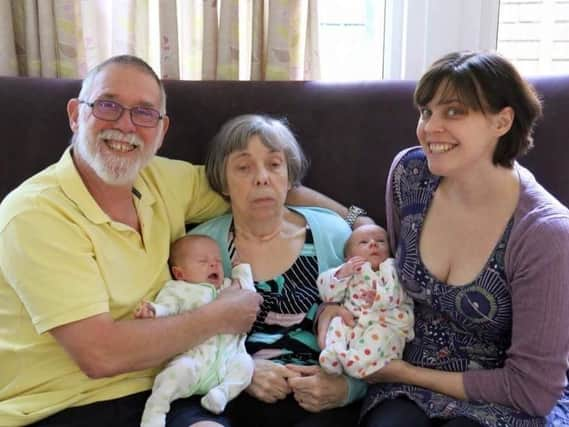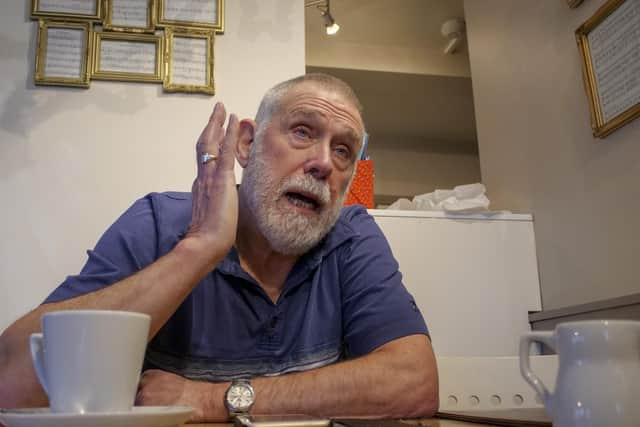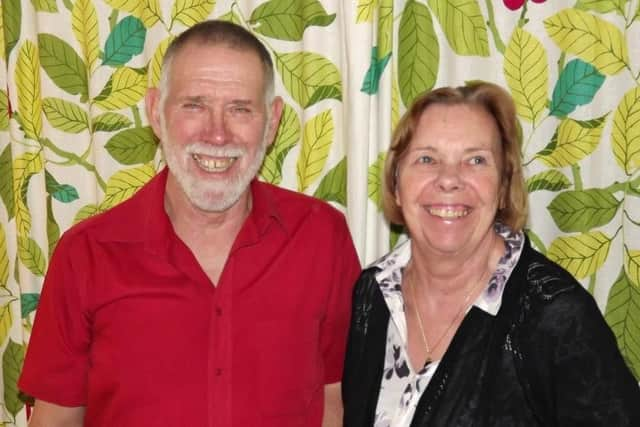Sheffield widower says '˜callous' health bosses took wife's dementia care away just weeks before she died


Julia Selby, aged 73, had suffered with the degenerative brain illness for the last 15 years, and for the last five had been cared for at the specialist Woodland View care home in Norton.
The care Julia received there cost £1,250 per week - or £65,000 per year - money the family could only afford because Julia qualified for NHS Continuing Healthcare funding or CHC.


Advertisement
Hide AdAdvertisement
Hide AdHowever, when the Sheffield Clinical Commissioning Group (CCG) reassessed Julia earlier this year, her funding was withdrawn, effectively forcing her out of the only home she could remember.
Her husband Peter, aged 75, of Greenhill, said: 'In the five years she was in Woodland View I had nothing but praise for the staff - the nurses and the carers.
'I couldn't imagine I would ever find a better place for Julia to be looked after.'
'In ordinary care homes the people never had the time or inclination to give the level of care she needed.


Advertisement
Hide AdAdvertisement
Hide Ad'The difference was that at Woodland View they would do that. That was the only appropriate place for her to be.'
Julia had initially moved to the Lightwood Lane home in 2013 after her increasingly violent behaviour became impossible for Peter to manage at home.
'She started throwing things at me like knives and scissors,' says Peter.
'Our daughters said they didn't know how I had coped for so long.'
Advertisement
Hide AdAdvertisement
Hide AdWhen someone gets CHC funding, the NHS pays your entire care costs except for personal clothing and toiletries.
However, in late 2016 or early 2017, the Department of Health decided that patients receiving the benefit should have to undergo an annual review to assess their continuing needs.
However, Peter says dementia is not really something that you can turn the clock back on.
'As I understand it Alzheimer's is a reduction in the number of brain cells and people do not grow them back,' he says.
Advertisement
Hide AdAdvertisement
Hide Ad'When I was told she would lose her funding I was appalled but not surprised because I know that this was what they were trying to do.
'They say it is not a money saving exercise but it obviously is. They have employed a team of nurses to do the assessments because they have got such a big backlog.'
Peter said that in the five years since Julia was first given her CHC funding, the former dietitian had deteriorated markedly.
By the end she could no longer move herself and had to be moved in a hoist from bed to chair.
Advertisement
Hide AdAdvertisement
Hide AdShe also shook and self-harmed and had developed epilepsy, a severe urine retention problem and a stomach ulcer which meant she coughed up blood.
And earlier this year, she was found face down at Woodland View after breaking the side of her bed in her sleep, presumably in a violent fit.
Nevertheless, after the decision was taken, Peter was given 28 days to appeal before her funding stopped.
As a result, instead of the £1,250 a week she had previously been awarded, the CCG decided she would be given just £128 per week.
Advertisement
Hide AdAdvertisement
Hide AdTragically, in the end it was immaterial and Julia died on July 23, just a few weeks after the decision was made.
'We were not expecting Julia to pass away as quickly as she did,' said Peter.
'But she was obviously declining and over about 10 days she went downhill very fast.'
Peter believes the way the CCG has treated him and his wife over the past 12 months has been nothing short of scandalous.
Advertisement
Hide AdAdvertisement
Hide Ad'It is totally callous and about taking money away from people who haven't got a voice themselves,' he says.
'I am well educated and still have all my marbles but not everyone ôhas the same ability to argue the toss.'
'I have had to worry for over a year while they were doing their reassessments and finding reasons to take funding away.
'If it wasn't for the support group charity things would have been very different.'
Advertisement
Hide AdAdvertisement
Hide AdThe former primary school teacher is now working with a solicitor employed by the Woodland View Dementia Support Group who hopes to make a case against the way the CCG has operated the reassessments.
So far, they have raised £20,000 to cover legal costs, with Peter and the couple's three daughters - Fiona, Greta and Rebecca - being responsible for a substantial part of that.
Rita Brookes of the Woodland View Dementia Support Group said: 'Whilst we know that reviews are an annual event they are stressful for relatives and we have to question the wisdom of the process when the person with dementia will never recover. Dementia is a one way ticket.
'The CCG does little to prepare relatives for the assessments which can last over two hours and consists of completing an incomprehensible form which even the professionals find hard to understand.
Advertisement
Hide AdAdvertisement
Hide Ad'When funding is removed vulnerable people with extreme dementia face eviction from the only place they remember as home.
'This is not only affecting our residents in our homes but also other vulnerable people across Sheffield. It is an inhumane way of treating anyone with a terminal illness.'
Mandy Philbin, Chief Nurse at NHS Sheffield CCG, said: 'We are unable to comment on specific cases but we offer our sincere condolences to Mr Selby and his family on their loss.
'Eligibility for continuing health care (known as CHC) funding is set nationally and based on an individual's healthcare need not a diagnosis.
Advertisement
Hide AdAdvertisement
Hide Ad'Some people with dementia may be eligible for free healthcare, but only if their primary need is for healthcare as opposed to social care.
'Social and personal care covers things like helping someone to get dressed or at mealtimes, or supporting someone to get out and about and healthcare covers things like treating or controlling an illness, disability or injury.
'As CHC funding is not indefinite funding, the patient's needs are reviewed in line with the national policy '“ all patients will be reviewed after three months and then again annually.
'This review is to ensure that the patient is receiving the right care in the right setting.
Advertisement
Hide AdAdvertisement
Hide Ad'We recognise that the National CHC process of applying, assessment, payment allocation and reviews of care is a complex process.
'We are working hard to develop a deeper level of understanding of what carers want to know and when by working closely with Healthwatch and carers forums to improve the information that we provide.
'We are also working closely with the local authority to support the way in which we deliver services across city.'